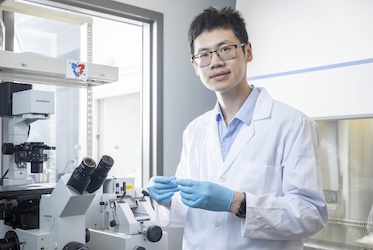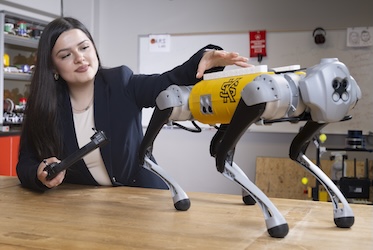
Eyes on the Road
MARIETTA, Ga. | Nov 28, 2018
Kennesaw State alumni acquire patent for retrofit blind spot detection system
A team of Kennesaw State University alumni are aiming to make roadways safer after inventing a blind spot detection system that can be retrofitted to older vehicles.
The inventors – former electrical engineering graduate students Andrew Kazemian, Federick Amuna, Ilyas Kure, Deshawn Edwards and Eli Franklin – became just the second student team in school history to obtain a patent with the help of the Kennesaw State University Research and Service Foundation (KSURSF). The device designed by the team can easily be installed without tools by mounting two wireless sensors on rear windows and placing a small indicator display on the dash.

Andrew Kazemian, from left, Fred Amuna and Ilyas Kure
The system was conceptualized in a product development course offered by the Southern Polytechnic College of Engineering and Engineering Technology, which guides students through the process of planning, designing and manufacturing a product or service using the technical skills they have acquired. Students are given the freedom to decide which real-world problem they would attempt to solve through engineering, and Kazemian said his team chose a device that could help prevent vehicle accidents.
“We decided that if we were going to pursue a product, it had to be something with potential to save lives,” said Kazemian, who along with his fellow inventors secured a patent for their design in October.
According to a recent Insurance Institute for Highway Safety (IIHS) study, blind spot detection systems were found to reduce the rate of lane-change crashes by 14 percent and the rate of lane-change crashes with injuries by 23 percent. However, Kazemian, who drives classic European cars, said there weren’t many viable options to equip older vehicles with blind spot detection systems.
During the Spring 2016 semester, Kazemian and his classmates worked late nights coding, soldering and 3D-printing the device on KSU’s Marietta Campus in order to develop a proof of concept. The initial prototype system was created on a budget of $500 and works by casting a microwave signal in the direction of the vehicle’s blind spot using the mounted sensors. When an object approaches the vehicle close enough to disrupt the signal, the driver is notified via the dashboard sensor.
With a working prototype, the team approached KSURSF about the potential to patent its invention. KSURSF is a nonprofit organization that, as part of its activities, manages intellectual property and performs technology transfer functions for the University. Additionally, the foundation works with faculty and students on patent discoveries that have commercial and economic potential. The foundation previously assisted KSU student Paul Ngalle obtain a patent for his online textbook streaming software program. Ngalle founded TreeCabin, which sought to provide college students with textbooks for a fraction of the normal printed cost.
The foundation also helps to ease the financial burden for students who wish to protect their intellectual property and connects them with experts who can streamline the patent-seeking process, said Carolyn Elliot-Farino, executive director of KSU’s Office of Research. The service is provided at no up-front cost to students and requires only a product with strong commercial potential and a business plan for moving forward.
“KSURSF becoming involved completely removed the anxiety of having to deal with the patent lawyers and the paperwork that comes with obtaining a patent,” Kazemian said. “It was a relief to know that we had a resource like that available. Without it, we might have never considered patenting our idea because of the high cost.”
Having created his own company, Kazemian Engineering Solutions, he now hopes to continue developing the product with former classmates Kure and Amuna. The group is looking to fine tune the design to meet the demands of the trucking industry and will look to ramp up development in early 2019, potentially licensing the system to a third-party manufacturer.
– Travis Highfield
Related Stories

Kennesaw State architecture, engineering students reimagine Asheville's devastated River Arts District

KSU researcher harnessing digital twin technology to improve heart care

Kennesaw State University researcher, students explore clean energy storage solutions

Kennesaw State student exploring the use of robotics in agriculture
A leader in innovative teaching and learning, Kennesaw State University offers undergraduate, graduate, and doctoral degrees to its more than 47,000 students. Kennesaw State is a member of the University System of Georgia with 11 academic colleges. The university’s vibrant campus culture, diverse population, strong global ties, and entrepreneurial spirit draw students from throughout the country and the world. Kennesaw State is a Carnegie-designated doctoral research institution (R2), placing it among an elite group of only 8 percent of U.S. colleges and universities with an R1 or R2 status. For more information, visit kennesaw.edu.















